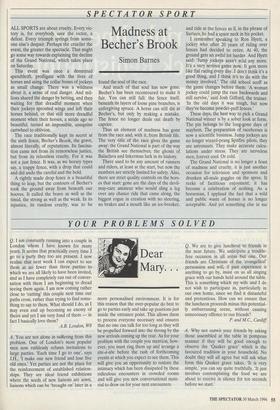SPECTATOR SPORT
Madness at Becher's Brook
Simon Barnes
ALL SPORTS are about cruelty. Every vic- tory is, for everybody save the victor, a defeat. Every triumph springs from some- one else's despair. Perhaps the crueller the event, the greater the spectacle. That might go some way towards explaining the decline of the Grand National, which takes place on Saturday.
This event was once a demented spendthrift, profligate with the lives of horses and using the collar bones of jockeys as small change. There was a wildness about it, a sense of real danger. And mil- lions shared the danger by betting, and then waiting for that dreadful moment when their jockeys sprouted wings and left their horses behind, or that still more dreadful moment when their horses, a stride ago so beautiful, turned an impossible, unequine cartwheel to oblivion.
The race traditionally kept its secret at the sixth fence, Becher's Brook, the grave, almost literally, of reputations. Its fascina- tion came not from its remorseless justice, but from its relentless cruelty. For it was not a just fence. It was, as we horsey types say, a trappy fence, with a drop that could and did undo the careful and the bold.
A rightly made drop fence is a beautiful thing to leap, but the contours of Becher's took the ground away from beneath our hooves. It culled the brave as well as the timid, the strong as well as the weak. In its injustice, its random cruelty, was to be found the soul of the race.
And much of that soul has now gone. Becher's has been recontoured to make it fair. You can still fall: the fence itself, beneath its layers of loose pine branches, is unforgiving spruce. A horse can still die at Becher's, but only by making a mistake. The fence no longer deals out death by caprice.
Thus an element of madness has gone from the race and, with it, from British life. The very title of the race gives the game away: the Grand National is part of the way the British see themselves; the ghosts of Balaclava and Inkerman lurk in its history.
There used to be any amount of runners and riders, at least at the start, but now the numbers are strictly limited for safety. Also, there are strict quality controls on the hors- es that start: gone are the days of the devil- may-care amateur who would sling a leg over any chance ride that came along, the biggest rogue in creation with no steering, no brakes and a mouth like an ice-breaker, and ride at the fences as if, in the phrase of Surtees, he had a spare neck in his pocket.
I remember speaking to Ron Hyett, a jockey who after 20 years of riding over fences had decided to retire. At 40, the ground gets an awful lot harder. And Hyett said: 'Jump jockeys aren't wild any more. It's a very serious game now. It gets more like flat racing every day. I don't think it's a good thing, and I think it's to do with the money involved.' The old school scoff as the game changes before them: 'A woman jockey could jump the race backwards and still survive,' said Josh Gifford, the trainer. 'In the old days it was tough, but now they've become powder-puff fences.'
These days, the best way to pick a Grand National winner is by a sober look at form. The pin belongs to the long-gone days of mayhem. The preparation of racehorses is now a scientific business. Jump jockeys are no longer wizard-prang Spitfire pilots, they are astronauts. They make accurate calcu- lations under stress. They are nerveless men, forever cool. Or cold.
The Grand National is no longer a feast of madness and cruelty, it is just another occasion for television and sponsors and drunken all-male gaggles on the spree. It reeks of factitious enjoyment; it has become a celebration of nothing. As a horseman, I applaud the fact that a wild and public waste of horses is no longer acceptable. And yet something else in me


























































 Previous page
Previous page